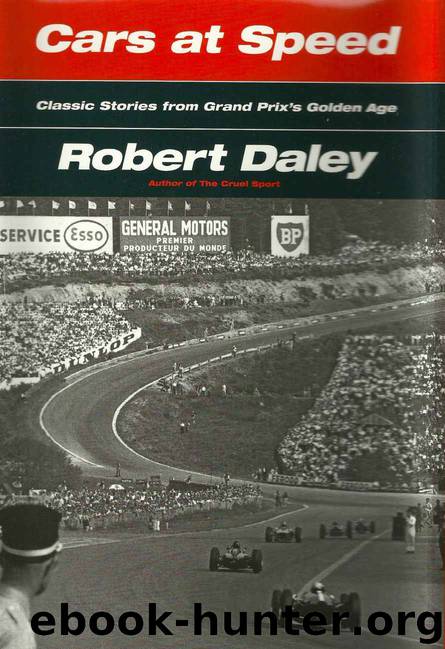CARS AT SPEED - Grand Prix's Golden Age by Daley Robert

Author:Daley, Robert [Daley, Robert]
Language: eng
Format: epub
Publisher: Riviera Productions Ltd.
Published: 2012-08-18T00:00:00+00:00
His lap times got slower and slower, and sometimes he weaved like a drunken man.
The crowd watched, breathless with excitement. Gould he do it, 24 hours alone, speeding round and round at 100 miles an hour where one mistake might mean death? Could he do it, unknown Pierre Levegh, a man 50 years old?
The crowd was ready to make him a national hero if he could.
One hour to go. 50 minutes.
The faltering robot that was Pierre Levegh led one Mercedes by 25 miles, the other by 35. He could ease off now; the race was his.
But he was too dazed to slow down. Tortured by cramps, unable to focus his eyes, hypnotized by the circuit he had lapped 300 times, he drove on and on until finally, in his colossal fatigue, he shifted down instead of up, and broke his engine.
An official brought Levegh back to the pits. He was so exhausted he could scarcely breathe. Then he began vomiting. For nearly an hour he gagged and choked. When that passed, finally, his wife took him in her arms and he wept his bitter disappointment. Would there ever again be a car for him at Le Mans?
Meanwhile, the two German Mercedes had swept across the finish line first and second. The 1952 Twenty-Four Hours was over.
The crowd watched in angry silence. It felt cheated by Levegh. It had been ready to cheer itself hoarse for him. But he had not won. Instead, by his selfishness and stupidity, he had lost a certain victory for France, leaving the crowd to assist at still another triumph for the hated Germans.
So the crowd's attitude, and that of all France, changed in a few moments. Levegh should have handed over to a co-driver. He had not. So he won no glory at all, only shame.
The Automobile Club, resenting his failure as much as everyone else, altered the rules so that no driver in the future could drive more than 14 hours.
But Levegh, his determination dulled but still there, came back to Le Mans the next year, and the next, and the next.
In 1953 he finished fifteenth.
In 1954 he crashed.
In 1955 Mercedes gave him his final ride.
The American John Fitch was to be his co-driver.
"It is too narrow for these fast cars," Levegh said to Fitch at practice. "Each time I go by the pits it is with a feeling of unease, a feeling of being hemmed in."
Another time Levegh told Fitch: "1 do not like sitting on the left in a racing car. It is difficult enough to see team signals with the pit straight and narrow as it is. A driver needs to feel comfortable. I do not feel comfortable in this car."
The two men had dinner together the night before the race at the remote hotel 25 miles from Le Mans where Levegh and his wife were staying. They talked of their strategy--they would avoid the early sprint, holding back while others exhausted themselves. After a while Levegh's spirits seemed to pick up.
Download
This site does not store any files on its server. We only index and link to content provided by other sites. Please contact the content providers to delete copyright contents if any and email us, we'll remove relevant links or contents immediately.
The Inner Game of Tennis by W. Timothy Gallwey(3675)
Unstoppable by Maria Sharapova(3521)
Crazy Is My Superpower by A.J. Mendez Brooks(3398)
Urban Outlaw by Magnus Walker(3392)
Mind Fuck by Manna Francis(3176)
The Social Psychology of Inequality by Unknown(3017)
The Fight by Norman Mailer(2927)
Unstoppable: My Life So Far by Maria Sharapova(2500)
Accepted by Pat Patterson(2364)
Going Long by Editors of Runner's World(2356)
Futebol by Alex Bellos(2353)
Sea Survival Handbook by Keith Colwell(2241)
Backpacker the Complete Guide to Backpacking by Backpacker Magazine(2240)
The Happy Runner by David Roche(2233)
Motorcycle Man by Kristen Ashley(2231)
The Sports Gene: Inside the Science of Extraordinary Athletic Performance by David Epstein(2167)
Peak: Secrets from the New Science of Expertise by Anders Ericsson & Robert Pool(2030)
Endure by Alex Hutchinson(2019)
The Call of Everest by Conrad Anker(1907)
